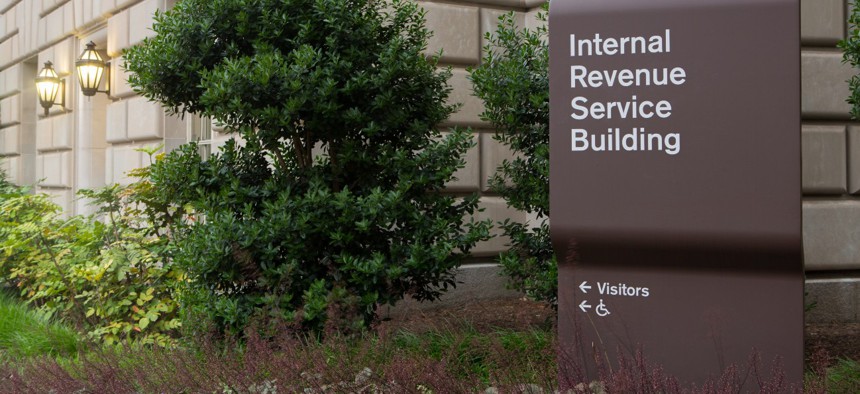
IRS has signed two contracts to help with the recruiting and onboarding of the tens of thousands of employees it hopes to bring on in the coming years. Skyhobo / Getty Images
The IRS Is Getting Some Help as It Prepares for a Hiring Spree
Some of the tax agency's major challenges will be tackled by the private sector.
The Internal Revenue Service is tapping into assistance from both inside and outside government as it readies itself for an unprecedented surge in funding and a corresponding surge in hiring.
IRS has signed two contracts to help with the recruiting and onboarding of the tens of thousands of employees it hopes to bring on in the coming years. The first, according to the Treasury Inspector General for Tax Administration, will task the vendor with preparing and posting job announcements, determining a list of qualified candidates and making tentative offers. The second will require the contractor to assist with background investigations, similar to IRS' own personnel security employees. The details of the awards were not publicly available and the agency declined to provide them.
IRS is slated to receive $80 billion by 2031 as part of the Inflation Reduction Act. According to an initial Treasury Department estimate, the funding could be used to hire as many as 87,000 employees. The total net employees will be a much smaller figure, however, as much of the hiring would be used to backfill vacant positions and replace those expected to leave in the coming years. IRS officials told the IG the agency will release its full plan for implementing the Inflation Reduction Act by mid-February.
The first contract IRS signed will tackle a key challenge the agency will face as it aims to increase its rolls. In 2022, nearly 600,000 individuals applied for jobs at IRS. The agency filtered through those prospective hires to make tentative offers to just 46,000 people. Less than half of that total, or just 3% of the original applicant pool, ultimately accepted offers and were onboarded at the agency.
Another significant hurdle for IRS’ hiring goals is the lengthy process to bring on a new employee. An original version of the Inflation Reduction Act included direct hire authority for the agency, but lawmakers ultimately stripped that provision from the bill. IRS instead went to the Office of Personnel Management to request the special authority, which allows agencies to bypass many of the hurdles that typically slow down the hiring process. OPM has granted IRS permission to make the quick hires for up to 10,000 Taxpayer Service and Enforcement positions per year through 2027. It also allowed for the expedited process for 4,500 positions in Operations Support.
Former IRS officials have stressed the importance of direct hire authority for the agency to meet its IRA targets. Prior to the law’s passage, then-IRS Commissioner Charles Rettig said the short-term authority Congress had provided through an appropriations bill had “rescued” the agency from “death” as it sought to deal with an unprecedented backlog of tax returns. The IG said OPM's approval would enable IRS "to satisfy mission-critical hiring needs" related to changes in tax law, customer outreach, "highly complex" tax compliance efforts, technology improvements and its ability to "transform the way the IRS does business."
National Taxpayer Advocate Erin Collins recently told Congress direct hire authority has allowed IRS to slash the number of days it takes from posting a job to onboarding someone in half. Collins also cautioned the hiring surge could have deleterious effects in the short term as existing employees are shifted away from their normal duties to help train newcomers.
“Staff increases come with growing pains,” Collins said.
Despite the efforts to improve IRS’ hiring capacity, the agency is already tempering expectations. It set the goal of filling 19,000 positions in fiscal 2023, though its human capital team told the IG that "realistically" the net gain of staff would be between 5,000 and 10,000. IRS officials said there is no risk of violating its pledge to not use its new funding to target taxpayers earning less than $400,000 per year as “employee attrition and hiring challenges will limit its ability to conduct more audits.”
IRS will face near constant headwinds as it seeks to implement the Inflation Reduction Act, including from congressional Republicans who have made it a top priority to claw back its funding infusion. The new Republican majority in the House passed a measure to do just that as its first piece of legislation in the 118th Congress. It is dead on arrival in the Senate and President Biden has said he would veto it anyway, but the fight will likely continue as lawmakers debate fiscal 2024 appropriations. In the meantime, IRS is not wasting time in using its funds to recruit new employees. It announced late last year it had brought on 4,000 new customer service representatives thanks to IRS funding. The agency also reduced the backlog of paper returns for individuals and businesses from 7.9 million at the start of 2022 to 1.4 million by late December.







